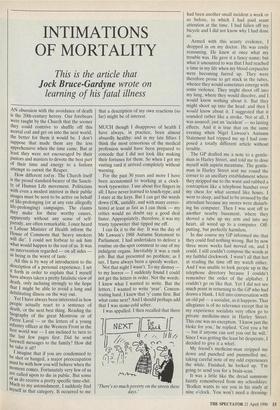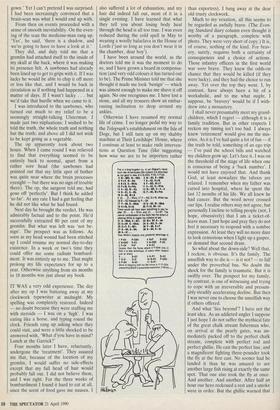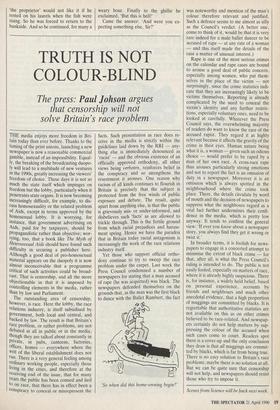INTIMATIONS OF MORTALITY
learning of his fatal illness
AN obsession with the avoidance of death is the 20th-century heresy. Our forebears were taught by the Church that the sooner they could contrive to shuffle off this mortal coil and get on into the next world, the better for them it would be. I don't suppose that made them any the less apprehensive when the time came. But at least they were not encouraged by their pastors and masters to devote the best part of their time and energy to a forlorn attempt to outwit the Reaper.
How different today. The Church itself is the proud standard-bearer of the Sancti- ty of Human Life movement. Politicians with even a modest interest in their public images must be seen to be active on behalf of life-prolonging (or at any rate allegedly life-prolonging) campaigns. The claims they make for these worthy causes, apparently without any sense of self- parody, are often remarkable. I once heard a Labour Minister of Health inform the House of Commons that `heavy smokers will die'. I could not forbear to ask him what would happen to the rest of us. It was an intervention regarded — on all sides as being in the worst of taste.
All this is by way of introduction to the description of a personal experience. I set it forth in order to explain that I myself have always taken a pretty fatalistic view of death, only inclining strongly to the hope that I might be able to avoid a long and debilitating illness on the way out. Yet I have always been interested in how people actually react to a sentence of death, or the next best thing. Reading the biography of the great Montrose or of Pierre Laval — or the letters of a young infantry officer at the Western Front in the first world war — I am inclined to turn to the last few pages first. Did he send farewell messages to the family? How did he take it all?
I imagine that if you are condemned to be shot or hanged, a major preoccupation must be with how you will behave when the moment comes. Fortunately very few of us are called upon to die in public. But some of us do receive a pretty specific time-chit. Much to my astonishment, I suddenly find myself in that category. It occurred to me that a description of my own reactions (so far) might be of interest.
MUCH though I disapprove of health I have always, in practice, been almost absurdly healthy: and in my late fifties I think the most censorious of the medical profession would have been prepared to concede that I did not look like making their fortunes for them. So when I got my visiting card it arrived completely without warning. For the past 30 years and more I have been accustomed to working at a clock- work typewriter. I use about five fingers in all; I have never learned to touch-type, and I stare at the keys. But I can get the words down (OK, untidily, and with many correc- tions) at least as fast as I can think — my critics would no doubt say a good deal faster. Appropriately, therefore, it was my trusty typewriter that tipped me off. I can fix it to the day. It was the day of Mr Lawson's 1988 Autumn Statement to Parliament. I had undertaken to deliver a routine on-the-spot comment to one of my indulgent organs. Inevitably it was a rush job. But that presented no problem; as I say, I have always been a speedy worker. Not that night I wasn't. To my dismay to my horror — I suddenly found I could not get the letters in order. Not the words: I knew what I wanted to write. But the letters. I wanted to write 'year'. Concen- trating hard, I knew that 'y' came first. But what came next? And I should perhaps add that I was stone-cold sober.
I was appalled. I then recalled that there 'There's so much poverty on the streets these days.' had been another small incident a week or so before, to which I had paid scant attention at the time. I had fallen off my bicycle and I did not know why I had done so.
Armed with this scanty evidence, I dropped in on my doctor. He was cosily reassuring. He knew at once what my trouble was. He gave it a fancy name; but what it amounted to was that I had reached a time in my life when my blood corpuscles were becoming furred up. They were therefore prone to get stuck in the tubes, whence they would sometimes emerge with some violence. They might shoot off into my lung, where they would dissolve, and I would know nothing about it. But they might shoot up into the head: and then I would know about it. I suggested that it sounded rather like a stroke. Not at all, I was assured; just an 'incident' — no lasting effects. And it is true that on the same evening when Nigel Lawson's Autumn Statement had tripped me up I had com- posed a totally different article without trouble.
The GP drafted me a note to a gentle- man in Harley Street, and told me to dose myself with aspirin meantime. The gentle- man in Harley Street sent me round the corner to an ancillary establishment where they stripped me to the waist and rubbed a contraption like a telephone handset over my chest for what seemed like hours. I went to sleep, and had to be aroused by the attendant because my snores were disturb- ing his computer. Then I was sent off to another nearby basement, where they shoved a tube up my arm and into my heart, all wired up to a computer. Off- putting, but perfectly harmless.
In due course my GP informed me that they could find nothing wrong. But by now three more weeks had moved on, and I could. I still couldn't compose the words at my faithful clockwork. I wasn't all that hot at reading the time off my watch either. And I was unable to look people up in the telephone directory because I couldn't remember the order of the alphabet. I couldn't go on like that. Yet I did not see much point in returning to the GP who had drawn a blank. I fell into conversation with an old pal — a socialist, as it happens. That allegiance is of no relevance except that in my experience socialists very often go to private medicine-men in Harley Street.
This one was no exception. 'I know just the bloke for you,' he replied. 'Cost you a bit — but if anyone can sort you out he will.' Since I was getting the least bit desperate, I decided to give it a whirl.
My friend's medicine-man stripped me down and punched and pummelled me, taking careful note of my odd experiences the while. Finished, he looked up. `I'm going to send you for a brain-scan.'
It was a little like the dread summons faintly remembered from my schooldays: `Bodkin wants to see you in his study at nine o'clock. You won't need a dressing- gown.' Yet I can't pretend I was surprised. I had been increasingly convinced that a brain-scan was what I would end up with.
From then on events proceeded with a sense of smooth inevitability. On the even- ing of the scan the medicine-man rang up. 'Yes', he said, 'there is a shadow, and we're going to have to have a look at it.'
They did, and duly told me that a gremlin had attached itself to the inside of my skull at the back, where it was making its presence felt. A sawbones had already been lined up to get to grips with it. If I was lucky he would be able to chip it off more or less like that, and I would be back in circulation as if nothing had happened in a matter of days. If I wasn't lucky . . . but we'd take that hurdle when we came to it.
I was introduced to the sawbones, who turned out much to my relief to be a seemingly straight-talking Ulsterman. I made just two stipluations: I wished to be told the truth, the whole truth and nothing but the truth; and above all I did not wish to be kept going as a vegetable.
The op apparently took about two hours. When I came round I was relieved to find that everything seemed to be entirely back to normal, apart from a rather sore head (the sawbones had pointed out that my little spot of bother was quite near where the brain processes eyesight — but there was no sign of trouble there). The op, the surgeon told me, had gone off 'perfectly'. But I think he added 'so far'. At any rate I had a gut feeling that he did not like what he had found.
Next day he brought the verdict. He was admirably factual and to the point. He'd successfully extracted 80 per cent of my gremlin. But what was left was 'not be- nign'. The prospect was as follows. As soon as my head wound had been stitched up I could resume my normal day-to-day existence. In a week or two's time they could offer me some radium bombard- ment. It was entirely up to me. That might prolong my life expectancy for up to a year. Otherwise anything from six months to 18 months was just about my book.
IT WAS a very odd experience. The day after my op I was battering away at my clockwork typewriter at midnight. My spelling was completely restored. Indeed — no doubt because they were stuffing me with steroids — I was on a 'high'. I was eating like a horse, and typing round the clock. Friends rang up asking when they could visit, and were a little shocked to be answered with, 'What d'you have in mind? Lunch at the Garrick?'
Four months later I have, reluctantly, undergone the 'treatment'. They assured me that, because of the location of my gremlin, I would suffer no side-effects except that my full head of hair would probably fall out. I did not believe them, and I was right. For the three weeks of bombardment I found it hard to eat at all, since the scent of food gave me nausea. I also suffered a lot of exhaustion, and my hair did indeed fall out, most of it in a single evening. I have learned that what they tell you about losing body heat through the head is all too true. I was even reduced during the cold spell in May to wearing a woolly balaclava in the House of Lords (just so long as you don't wear it in the chamber, dear boy').
I have been around the world, as the doctors told me it was the moment to do so, and I have grown a beard in compensa- tion (and very odd colours it has turned out to be). The Prime Minister told me that she thought it made me look 'benign' — which was almost enough to make me shave it off again. No one recognises me. I have lost a stone, and all my trousers show an embar- rassing inclination to drop around my ankles.
Otherwise I have resumed my normal life of crime. I no longer pedal my way to the Telegraph's establishment on the Isle of Dogs, but I still turn up on my shabby machine at Their Lordships' House, where I continue at least to make rude interven- tions at Question Time (like suggesting how wise we are to be importers rather than exporters). I bang away at the dear old trusty clockwork.
Much to my vexation, all this seems to be regarded as awfully brave. (The Even- ing Standard diary column even thought it worthy of a paragraph, complete with photo. They were very short of copy.) It is, of course, nothing of the kind. For brav- ery, surely, requires both a certainty of consequences and a choice of actions. Those infantry officers in the first world war were brave. They knew the odds-on chance that they would be killed (if they were lucky), and they had the choice to run away. Yet over the top they went. I, by contrast, have always been a bit of a workaholic, and to me what might, I suppose, be 'bravery' would be if I with- drew into a monastery.
I shall never presumably meet my grand- children, which I regret — although it is a family tradition. But in other respects I reckon my timing isn't too bad. I always knew 'retirement' would give me the mis- eries. As it is I've had quite a lot of fun — if the truth be told, something of an ego trip — I've paid the school bills and watched my children grow up. Let's face it, I was on the threshold of the stage of life when one is conscious of being a 'back number'. I would not have enjoyed that. And thank God, at least nowadays the taboos are relaxed. I remember when my father was carted into hospital, where he spent the last 12 months of his life. We all knew he had cancer. But the word never crossed our lips. I realise others may not agree, but personally I incline to telling people (not, I hope, obsessively) that I am a ticket-of- leave man. I just hope and pray they do not feel it necessary to respond with a sombre expression. At least they will no more dare to look censorious when I light up a gasper, or demand that second dram.
So what about the down-side? Well that, I reckon, is obvious. It's the family. The unselfish way to die is — is it not? — to fall under the proverbial bus. No doubt the shock for the family is traumatic. But it is swiftly over. The prospect for my family, by contrast, is one of witnessing and trying to cope with an irreversible and presum- ably steadily accelerating decline. But then I was never one to choose the unselfish way if others offered.
And what 'lies beyond'? I have not the least idea. As an addicted angler I suppose I just hope I do not suffer the mythical fate of the great chalk stream fisherman who, on arrival at the pearly gates, was im- mediately packed off to the perfect chalk stream, complete with perfect rod and perfect ghillie. He cast the perfect line, and a magnificent fighting three-pounder took the fly at the first cast. No sooner had he landed it than he was amazed to see another large fish rising at exactly the same spot. That one also took the fly at once. And another. And another. After half an hour our hero reckoned a rest and a smoke were in order. But the ghillie warned that 'the proprietor' would not like it if he rested on his laurels when the fish were rising. So he was forced to return to the bankside. And so he continued, for many a weary hour. Finally to the ghillie he exclaimed, 'But this is hell!'
Came the answer: 'And were you ex- pecting something else, Sir?'




















































 Previous page
Previous page